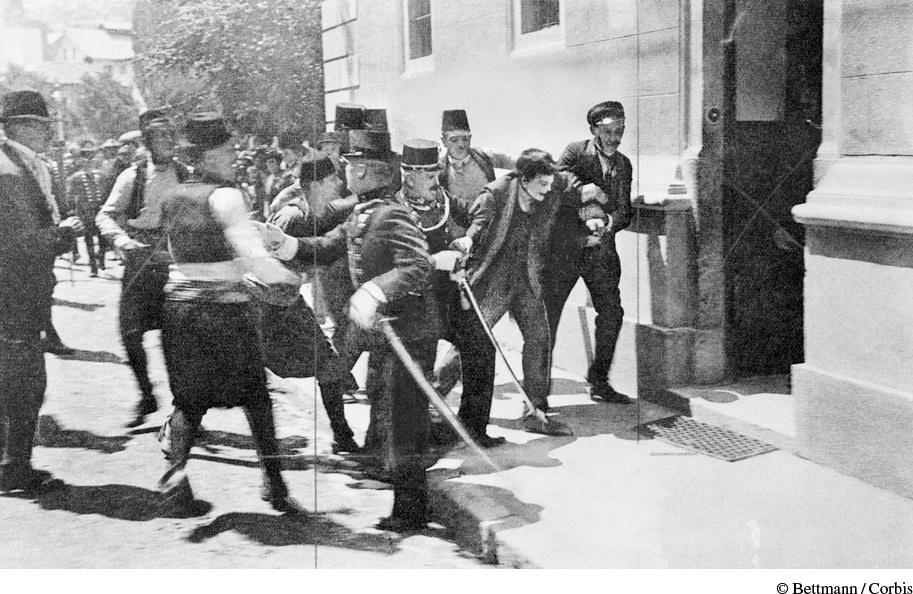1914: War Erupts
Printed Page 814
Important Events1914: War Erupts
June 28, 1914, began as an ordinary, even happy day not only for Freud’s patient the Wolf-Man but also for the Austrian archduke and heir to the Habsburg throne, Francis Ferdinand, and his wife, Sophie, as they ended a state visit to Sarajevo in Bosnia riding in a motorcade. In the crowd was a Serb nationalist, Gavrilo Princip, who had traveled in secret for several weeks to reach this destination, dreaming of reuniting his homeland of Bosnia-Herzegovina with Serbia and smuggling weapons with him to accomplish his end. Princip shot dead the unprotected and unsuspecting Austrian couple.
Some in the Habsburg government saw the assassination as an opportunity to put down the Serbians once and for all. Evidence showed that Princip had received arms and information from Serbian officials, who directed a terrorist organization from within the government. Endorsing a quick defeat of Serbia, German statesmen and military leaders urged the Austrians to be unyielding and promised support in case of war. The Austrians sent an ultimatum to the Serbian government, demanding suppression of terrorist groups and the participation of Austrian officials in an investigation of the crime, among other things. “You are setting Europe ablaze,” the Russian foreign minister remarked of the Austrians’ humiliating demands made on a sovereign state. Yet the Serbs were conciliatory, accepting all the terms except the presence of Austrian officials in the investigation. Kaiser William was pleased: “All reason for war is gone.” His relief proved unfounded. Austria-Hungary, confident of German backing, used the Serbs’ resistance to one demand as the pretext for declaring war against them on July 28.
Some statesmen tried desperately to avoid war. Even the tsar and the kaiser sent pleading letters to one another not to start a European war. Still, Germany displayed firm support for Austria in hopes of convincing the French and British to stay out of the war and thus keep Russia from mobilizing. Additionally, German military leaders had become fixed on fighting a short, preemptive war that would provide territorial gains leading toward the goal of a Mitteleuropa. As conservatives, they planned to impose martial law the minute war began, using it as an excuse for arresting the leadership of the German Social Democratic Party, which threatened their rule.

REVIEW QUESTION What were the major factors leading to the outbreak of World War I?
The European press caught the war fever of nationalist and pro-war organizations, and military leaders, especially in Germany and Austria-Hungary, promoted mobilization rather than diplomacy in the last days of July. The Austrians declared war and then ordered mobilization on July 31 in full confidence of German military aid, because as early as 1909 Germany had promised to defend Austria-Hungary, even if that country took the offensive. Nicholas II ordered the mobilization in defense of the Serbs—Russia’s Slavic allies. Encouraging the Austrians to attack Serbia, the German general staff mobilized on August 1. France declared war by virtue of its agreement to aid its ally Russia, and when Germany violated Belgian neutrality on its way to invade France, Britain entered the war on the side of France and Russia.